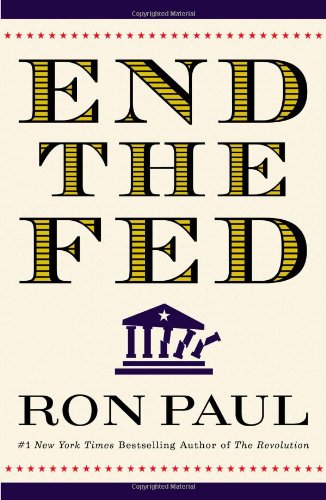Recently by Ron Paul: The Fed’s Interesting Week
Near the start of this year Ron Paul (R-Texas) introduced H.R. 1207, the Federal Reserve Transparency Act of 2009. The bill was referred to the House Committee on Financial Services. As of this writing, H.R. 1207 has 282 cosponsors.
A Senate equivalent, S.604, the Federal Reserve Sunshine Act of 2009, has been introduced by Bernie Sanders (I-Vt.). It has 23 cosponsors. Both bills have received a tremendous groundswell of grass-roots support. Much of the support is coming from ordinary people who have become aware of the fact that the Federal Reserve has created trillions of dollars literally out of nothing during the past calendar year in its effort to micromanage its way out of the worst economic crisis since the Great Depression.
 End the Fed
Best Price: $1.12
Buy New $8.53
(as of 10:10 UTC - Details)
End the Fed
Best Price: $1.12
Buy New $8.53
(as of 10:10 UTC - Details)
If such a measure were passed by both houses of Congress and signed into law by President Obama, the resulting bill would allow the Government Accounting Office to conduct audits of Federal Reserve System monetary policy. The bill proposes to scrutinize the Fed’s dealings not just on domestic monetary policy but on dealings with foreign central banks and foreign governments.
The power elite is worried. Evidence for this can be found in a short article “The Fed’s Political Problem” appearing on the website of Foreign Affairs, flagship journal for the Council on Foreign Relations (CFR). The article’s author, Alan S. Blinder, is a senior-level economics professor at Princeton University who also directs Princeton’s Center for Economic Policy Studies. From 1994 to 1996 he served as vice chairman of the Board of Governors of the Federal Reserve System.
 The Revolution: A Mani...
Best Price: $1.99
Buy New $6.99
(as of 11:00 UTC - Details)
The Revolution: A Mani...
Best Price: $1.99
Buy New $6.99
(as of 11:00 UTC - Details)
Blinder first argues a thesis he proposed back in 1997, that some areas of government are properly political and others are properly technocratic. He places monetary policy in the latter, where it can operate independently of political oversight. The drawback of Ron Paul’s bill is that it would transfer Fed oversight to the political realm and end its independence.
Blinder describes Dr. Paul as u201Can extreme libertarian and longtime foe of the Fed. He has, incredibly, persuaded almost two-thirds of the House of Representatives to co-sponsor a bill that would jeopardize the Fed’s independence.u201D According to Blinder, the Fed u201Cgets plenty of critical evaluationsu201D of its policies and decisions. He maintains that Dr. Paul’s bill u201Ccould easily develop into something quite dangerous.u201D He imagines this scenario:
Sometime in 2010, the Fed, wanting to avoid inflation, will likely begin to abandon the hyper-expansionary monetary policy it adopted during the recent crisis as a way to stave off a depression. As it does so, interest rates will start rising even as unemployment remains high. Predictably, Congress, being more closely attuned to public opinion, will be unhappy with this situation. Until now, the Fed’s independence has ensured that it can afford to ignore public opinion and take such necessary but unpopular economic measures. That is precisely why we want an independent monetary policy. But if the Paul bill passes, angry members of Congress could ask for a GAO audit. And, if the report is critical, they could use it to browbeat members of the Federal Open Market Committee, the Fed’s interest-rate-setting body, for killing the country’s economic recovery.
September 9, 2009




